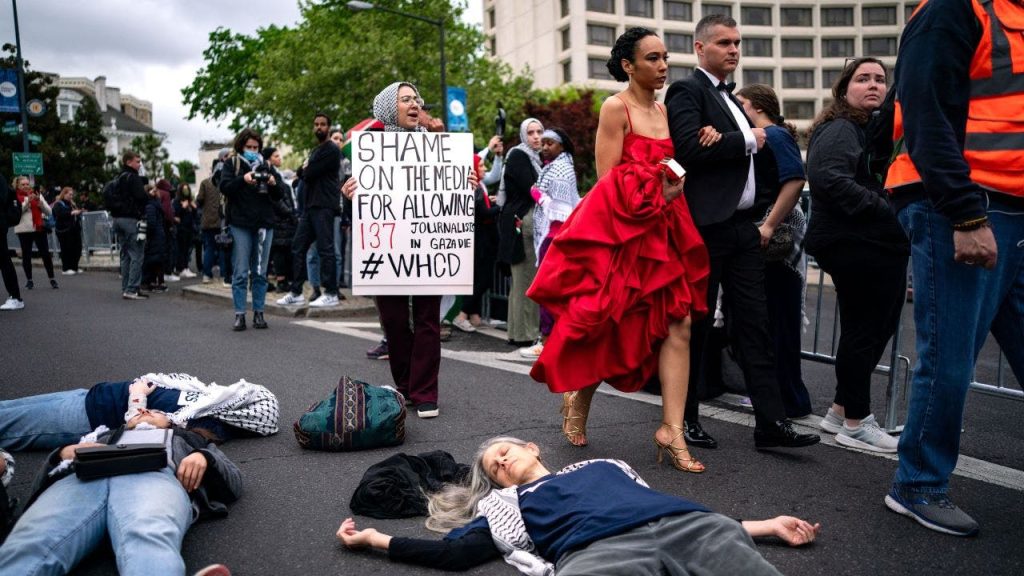Anti-Israel protestors organized by Code Pink marched through Washington, D.C., to protest American support of the Israeli military, specifically targeting journalists attending the White House Correspondents’ Dinner. The organization accuses the media of endorsing the White House’s support of Israel and ignoring Israeli war crimes. Demonstrators beat drums and shouted “Shame on you!” at attendees of the dinner, many of whom were dressed in tuxedos and ball gowns. The protestors, wearing keffiyehs, waving Palestinian flags, and holding signs lamenting the loss of human life in Gaza, aim to bring attention to what they see as complicity in the administration’s actions.
The impact of these protests on President Biden, who was expected to attend the dinner, remains unclear. The demonstrations follow a surge of anti-Israel protests across the country, with universities hosting encampment protests and clashes with police resulting in multiple arrests. Columbia University saw over 100 students participate in tent demonstrations, while Harvard University, University of Southern California, and University of Texas at Austin all experienced heated protests. Arizona State University witnessed nearly 70 demonstrators being arrested, many of whom were not affiliated with the university. The protests reflect a national trend of escalating anti-Israel sentiments and growing unrest over American support for the Israeli military.
Code Pink’s protest highlights concerns about the media’s coverage of Israel and the Palestinian territories, arguing that the Correspondents’ Dinner has become a platform that celebrates and endorses the administration’s actions. The organization accuses the U.S. media of perpetuating anti-Palestinian narratives while ignoring Israeli war crimes. By marching through Washington, D.C., protestors aim to draw attention to what they see as complicity in the oppression of Palestinians. The protests come at a time when anti-Israel demonstrations have gained momentum nationwide, sparking clashes with police and leading to numerous arrests at universities across the country.
The increase in anti-Israel sentiments is palpable at universities like Columbia, Harvard, USC, and UT Austin, where students have engaged in heated demonstrations that have led to confrontations with law enforcement. The protests have also spread to other states, with Arizona State University seeing a significant number of arrests among demonstrators. The nationwide disruptions reflect a broader social and political discourse surrounding American support for the Israeli military and the treatment of Palestinians. The protests serve as a platform for expressing opposition to what many see as unwavering support for Israel and the lack of accountability for alleged war crimes in the region.
The White House Correspondents’ Dinner, traditionally seen as a symbol of journalistic integrity and freedom, has now become a focal point for criticism of the media’s coverage of Israel. Code Pink’s protest is part of a larger movement to challenge the mainstream narrative on the Israeli-Palestinian conflict and draw attention to the plight of Palestinians. The involvement of media members attending the dinner adds a layer of complexity to the demonstration, as protesters highlight what they view as complicity in the perpetuation of anti-Palestinian narratives. The continued nationwide disruptions demonstrate a growing discontent with American policies regarding Israel and a desire for change in how the media covers the conflict in the Middle East.
The protests in Washington, D.C., and across the country represent a diverse range of voices calling for accountability, justice, and an end to what they see as complicity in the oppression of Palestinians. The anti-Israel agitators are leveraging public demonstrations to raise awareness about American support for the Israeli military and to challenge the mainstream narrative on the conflict. By targeting journalists attending the White House Correspondents’ Dinner, protestors aim to hold the media accountable for their coverage of Israel and Palestine. The protests mark a significant moment in the ongoing debate over U.S. policies in the Middle East and the need for a more nuanced and balanced approach to reporting on the Israeli-Palestinian conflict.


